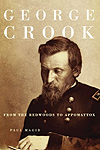 George Crook: From the Redwoods to Appomattox, by Paul Magid, University of Oklahoma Press, Norman, 2011, $39.95
George Crook: From the Redwoods to Appomattox, by Paul Magid, University of Oklahoma Press, Norman, 2011, $39.95
As a military leader and public figure, George Crook was everything George Custer was not. An unassuming farm boy from Ohio, Crook was intensely private—even his autobiography reveals little about the man. So tackling a two-volume biography would be a daunting task for even veteran historians. Enter Paul Magid, a retired attorney and former Peace Corps worker, whose first volume about Crook won the 2012 Spur Award as best Western nonfiction biography from Western Writers of America (see Interview).
After graduating from West Point in 1852, Crook served in the Pacific Northwest. “Absorbed in his military duties and his love affair with the wilderness, and perhaps fortified by his Methodist upbringing, Crook avoided the soldier’s pitfalls—tobacco, liquor and gambling,” Magid writes. Crook’s first posting lasted only nine years, but Magid notes that his Western military legacy began there. By the time of Crook’s death in 1890, after prominent campaigns against the Lakotas, Cheyennes and Apaches, he was considered not only one of the best Indian-fighting generals but also a champion of Indian rights. The bulk of Magid’s new biography focuses on Crook’s Civil War service, detailing his successes (Antietam, Shenandoah, Chattanooga, Appomattox) and failures, including his capture and kidnapping by Confederate partisan rangers. Thoroughly researched and incredibly detailed, this is a terrific introduction to one of the West’s greatest military figures. It should appeal to Western and Civil War buffs alike.
—Johnny D. Boggs




